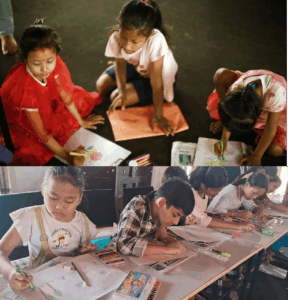The Power of a Library: How Jhuwani’s Lifeline Transformed a Village Across Generations
15 September 2025
Long after their children had left for the cities, the elders of Jhuwani would return not to an empty home, but to a quiet space inside the village library – a sanctuary against loneliness. Instruments in hand, stories in their hearts, they would sing bhajans (religious chants), share memories with community members in the library, and speak softly of times that had changed them.

“This library,” one said through tears, “has not only taught us how to live—but how to grow old with peace, purpose, and dignity.”
But the story of that library did not begin with books. It began with a tragedy.
More than twenty years ago, in the small village of Jhuwani in Chitwan, a river divided families from hospitals, schools, and from each other. One day, the youth watched in helpless horror as a pregnant woman was swept away by the current, simply because there was no safe way to cross.
That moment changed everything.
Spurred by grief, the young people of Jhuwani built a bridge. When the construction was complete, they used leftover materials to imagine something greater, a library. To lay its foundation, they invited the oldest members of the community. One by one, the elders stepped forward, each placing a stone and with it, a blessing for the future.
That vision soon found resonance with READ Nepal, and together, they gave life to the Jhuwani Community Library and Resource Center.
Over the years, the library became far more than a building.
It became a movement. A lifeline. A family.
- More than 500,000 community membershave been served by the
- A women-led savings cooperativenow supports over 6678 women, circulating nearly 829,689.05 USD in local transactions.
- An ambulance from the librarysaved lives during conflict and helped deliver over 3,218
- Sixty villagersrecovered from tuberculosis with medicine administered through the library as hospitals were not easily accessible.
But numbers don’t carry the soul of Jhuwani. Stories do.
There was Bamiya, who read illustrated books while grazing cattle. One story made her quit chewing betel nut. She had insanely chewing it every moment. Another woman said: “People buy milk from my cows now. They never did before—because I was considered untouchable. The library changed that.” Newly married women received welcome kits. Pregnant women received free ambulance access. This care was not a charity, but a commitment.
And then there were the children.
When asked for data on child visitors, the library committee did not send statistics. Instead, they sent a photo of dozens of tiny slippers scattered outside the library door. That image said it all. The library was alive.

One of those slippers belonged to Anil. As a boy, Anil came to the library to play, read, sing, and touch a computer for the first time. “We didn’t have toys, books, or a TV at home,” he remembers. “The library gave us all of that. That’s why we came. That’s why we kept coming.”
Anil became a volunteer. He received training in computers. He joined the Practical Answers program. Years later, when the library was struggling, he ran for President of the Library Management Committee, not for the prestige, but from a place of gratitude.
“The library raised me. Now it’s my turn to raise it back up.”
By then, Jhuwani had changed. Many youths had left the village. Families had fragmented. The elderly were lonely. So, Anil and his team created a special space in the library just for them.
And so, they returned, grandfathers with harmoniums, grandmothers with bhajans, elders with tales. Their presence brought back not just songs, but strength. And something even more beautiful happened. The children began joining them. The library had become a bridge again—not just over water, but across generations.
We often call it a “Centre.” But it is more than that.
- It is a place where the past and future meet.
- Where the elder who once laid a stone now smiles at a child curled up with a book.
- Where tiny slippers still mark the pulse of community.
- Where giving back isn’t a gesture, it’s a way of life.
“I never went abroad,” Anil says. “I never moved to the city. I want to build my life here by serving this community. That’s where I find fulfillment.”
Anil’s story is just one, but it carries the heartbeat of Jhuwani. A village where a library didn’t just house books, it built a future. Where people were trusted, and they transformed.
This is the power of a library.
This is the story of Jhuwani.
Contributed by Sanjana and Anil